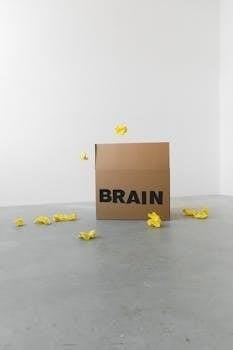Exploring brain exercises is vital for enhancing memory. Engaging in activities that stimulate the mind can lead to improved cognitive function and overall brain health. These exercises are accessible, and beneficial for all ages.
Importance of Memory Training
Memory training is crucial for maintaining cognitive health and enhancing daily functioning. It helps in preserving mental agility and problem-solving capabilities. Regular memory exercises can mitigate age-related cognitive decline, improving overall quality of life. Such training enhances focus, concentration, and the ability to learn and remember new information effectively. Moreover, it contributes to better verbal memory and boosts confidence in everyday tasks. Consistent practice with memory training techniques also improves working memory, making daily activities simpler and more efficient. It’s not just about remembering; it’s about preserving brain function and staying sharp at any age, therefore increasing an individual’s overall well-being and cognitive reserve.

Types of Brain Exercises
Various brain exercises exist, including aerobic activities, neurobic exercises, and cognitive rehabilitation techniques. These diverse methods offer different ways to stimulate the brain and improve memory.
Aerobic Exercise and Memory
Regular aerobic exercise, such as walking, running, or dancing, significantly boosts brain health. These activities increase blood flow, delivering vital oxygen and nutrients to the brain. This enhanced circulation supports improved cognitive functions, including memory. Consistent physical activity can reduce age-related cognitive decline, including learning and memory losses. Engaging in aerobic exercise is beneficial for both overall physical well-being and long-term memory enhancement. It’s a simple yet powerful way to keep your brain sharp and promote mental agility. Incorporating regular aerobic exercise into your routine contributes to a healthier, more resilient mind and better memory retention.
Neurobic Exercises for Brain Stimulation
Neurobic exercises offer a unique approach to brain stimulation, utilizing the five senses in novel ways. Unlike traditional memory exercises, neurobics aims to form connections between different types of information, enhancing the brain’s natural drive. These activities involve engaging your senses in unusual and unexpected ways, such as trying new routes, or experiencing familiar situations with a different sensory focus. Neurobic exercises are very different from logic puzzles or solitary practice sessions. This approach promotes cognitive flexibility and enhances memory retention. By stimulating the brain with sensory input, neurobics helps keep your mind sharp and adaptable, thus improving overall brain function.
Cognitive Rehabilitation Exercises
Cognitive rehabilitation exercises are designed to help individuals improve their cognitive functions, including memory, reasoning, and problem-solving skills. These exercises often involve real-world scenarios, making them practical for everyday use. For example, remembering a sequence of images or numbers presented initially can greatly aid memory recall. These rehabilitation exercises help individuals maintain mental acuity and improve memory. They might include activities that focus on working memory, attention, and language. This type of exercise is beneficial for people experiencing cognitive decline due to various reasons. They provide a structured way to engage the brain and improve cognitive performance. These exercises are adaptable to individual needs, making them a valuable memory tool.

Specific Memory Improvement Techniques
Various techniques can enhance memory, including visual aids and mnemonic devices. These methods help to organize information, making it easier to remember. Effective strategies often involve active engagement and repetition.
Working Memory Exercises
Working memory is crucial for daily tasks, and specific exercises can significantly improve its capacity. These exercises often involve holding and manipulating information in your mind. Start with simple tasks like counting backwards from a number by twos or threes. Gradually increase the complexity as you progress, trying sequences of numbers or words. Visual working memory can be challenged with pattern memorization and reproduction. Games that require remembering sequences or locations can also be very beneficial. Consistent practice with these exercises will enhance your ability to focus, retain information, and perform complex cognitive operations more efficiently. Remember to challenge yourself to experience real improvements.
The Suitcase Game
The Suitcase Game is a fun and engaging memory exercise that is perfect for groups. This game involves a round-table format where each person adds an item to an imaginary suitcase, building upon the previous items. The first player starts by saying, “I’m going on a trip, and in my suitcase, I’m bringing a…” and names an item. The next player repeats the first item and adds their own. The game continues, with each player reciting all previous items in the correct order before adding a new one. This enhances recall and concentration, making it a great way to improve short-term memory. It also fosters attention and listening skills, all while enjoying an interactive game.

Practical Resources and Tools
Numerous resources exist to aid memory training, including printable PDF worksheets and comprehensive memory training programs. These tools offer structured exercises for memory improvement.
Printable PDF Memory Worksheets
Accessing printable PDF memory worksheets offers a convenient way to engage in brain training. These worksheets often include a variety of exercises designed to target different aspects of memory, such as working memory and recall. Available in downloadable formats, these resources provide flexibility, allowing users to print them at their convenience, or to complete them digitally. Many options include unique worksheets, focusing on various cognitive skills. These materials can be used by individuals of all ages seeking to improve memory. The variety of formats enables users to select exercises suited to their specific needs and preferences, offering a structured approach to memory enhancement.
Memory Training Programs and Guides
Memory training programs and guides provide structured approaches to improving memory. These resources often incorporate evidence-based exercises and techniques designed to enhance cognitive abilities. Such programs may include a variety of activities, such as logic puzzles, memory games, and strategy-based challenges, all aimed at stimulating the brain. Many guides offer practical advice on how to incorporate these exercises into daily routines. Some programs are available in digital formats, while others offer printable guides for ease of use. These resources may cater to different age groups and various levels of memory ability, providing personalized paths for improvement. They emphasize consistent practice for achieving optimal results.
Lifestyle Factors Impacting Memory
Lifestyle choices significantly influence memory. Factors like sleep, diet, and physical activity play crucial roles in cognitive function. Addressing these areas can lead to noticeable memory improvement.
Sleep and Memory Enhancement
Adequate sleep is essential for memory consolidation. During sleep, the brain processes and stores information acquired during the day. A lack of sleep can impair cognitive functions, including memory and recall. Prioritizing a consistent sleep schedule and ensuring sufficient rest are crucial for optimal brain function. Sleep deprivation hinders the brain’s ability to effectively transfer short-term memories into long-term storage. This process is vital for retaining information and experiences. Therefore, establishing healthy sleep habits is a fundamental step in enhancing memory and overall cognitive performance. It is crucial to allow the brain sufficient time to complete its necessary restorative processes.
Diet and Memory
A balanced diet plays a crucial role in supporting memory function. Consuming nutrient-rich foods provides the brain with essential vitamins and minerals necessary for optimal performance. Foods rich in antioxidants, omega-3 fatty acids, and B vitamins are particularly beneficial for cognitive health. A diet lacking in these nutrients can negatively impact memory and overall brain function. Hydration is also vital for cognitive processes, as dehydration can impair memory and concentration. Therefore, maintaining a healthy and balanced diet is crucial for enhancing and maintaining memory function. This includes consuming a variety of fruits, vegetables, and whole grains. Limiting processed foods can also contribute to better memory.

Conclusion and Future Steps
Incorporating brain exercises into your life can significantly improve memory. Consistent practice and a healthy lifestyle contribute to long-term cognitive benefits. Start today and see the positive changes.
Implementing Memory Exercises into Daily Routine
To effectively integrate memory exercises, start by setting aside dedicated time each day. Begin with simple activities like recalling your day or using printable PDF worksheets that offer structured memory training. Consistency is key, so aim for the same time each day to make it a habit. Consider incorporating neurobic exercises, which engage your senses in novel ways, during your regular routine. Mix things up to keep your brain challenged and prevent boredom. Don’t be afraid to start small and gradually increase the difficulty and time spent on exercises. Remember, even short periods of focused practice can lead to noticeable improvements over time. Focus on exercises that are fun and engaging, making the process more enjoyable and sustainable. Finally, track your progress to see how far you’ve come and keep yourself motivated.

Leave a Reply
You must be logged in to post a comment.